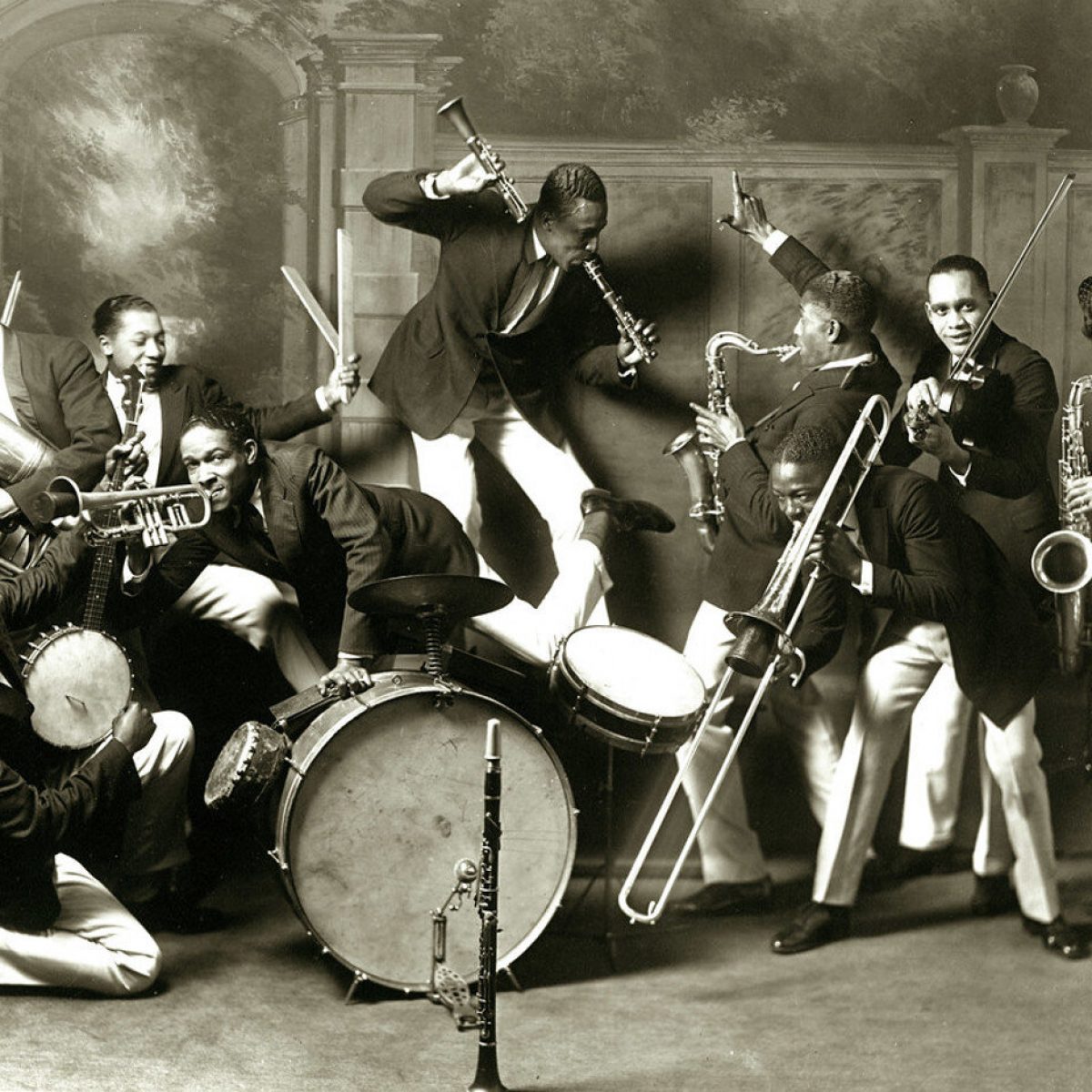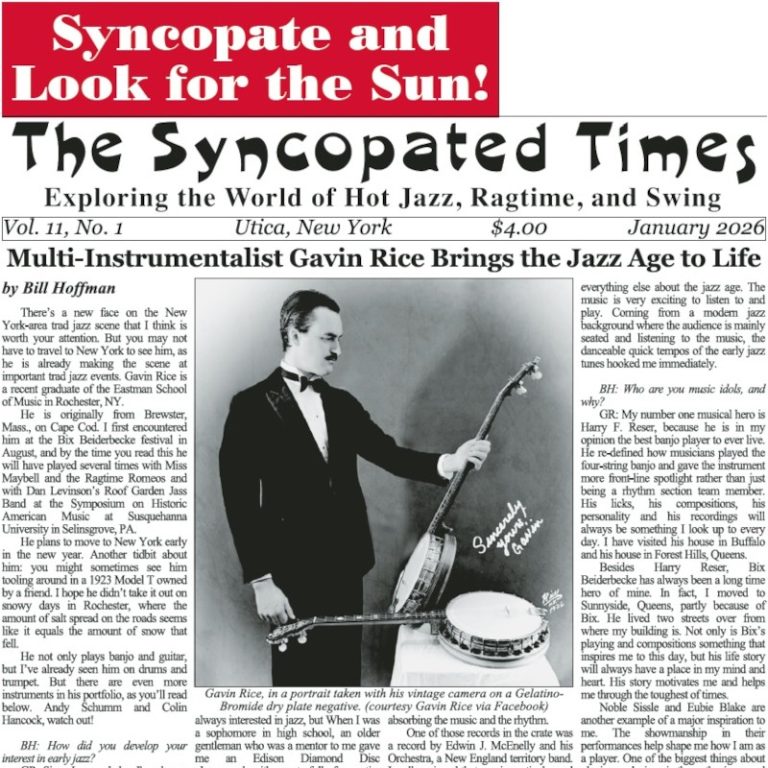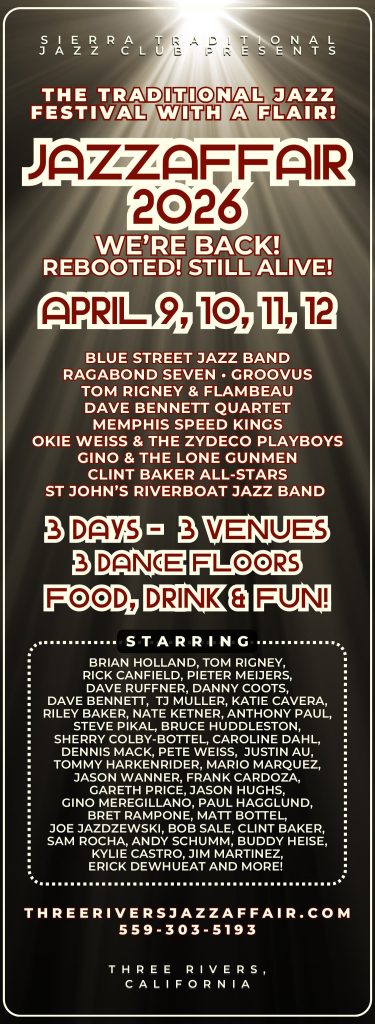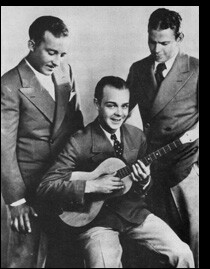 Bing Crosby and Al Rinker had been together in a Jazz band in Spokane, Washington while in college. The band was so popular that the two dropped out of college and drove Rinker’s Model T to Los Angeles where Rinker’s sister, Mildred Bailey, who was a Jazz singer was working.
Bing Crosby and Al Rinker had been together in a Jazz band in Spokane, Washington while in college. The band was so popular that the two dropped out of college and drove Rinker’s Model T to Los Angeles where Rinker’s sister, Mildred Bailey, who was a Jazz singer was working.
Shortly after their arrival in Los Angeles they landed a gig on the vaudeville circuit, as a vocal act. Some members of Paul Whiteman’s Orchestra, caught their act and recommended them to Whiteman who hired them in October of 1926. While waiting to join Whiteman’s Orchestra they made their first record “I’ve Got the Girl” with Don Clark’s Orchestra ( (a former member of Whiteman’s Orchestra) at The Biltmore Hotel in Los Angeles (506 South Grand Ave.).
Bing and Al then joined the Whiteman Orchestra in Chicago, where they made their first records with Whiteman. At first, things didn’t go well for Crosby and Rinker. Whiteman’s audience didn’t like them and the theatre manager where they were playing at the time asked that they be dropped from the act, but rather than drop them, Whiteman added a young singer and song writer, Harry Barris to the act. The act was billed as the Rhythm Boys.
The trio sang in three part harmony with both Rinker and Barris playing piano. Barris wrote a song called “Mississippi Mud” which became a hit with the Whiteman Orchesta and featured Bix Beiderbecke on cornet. But after awhile, Whiteman and Crosby were not getting along. Bing drank a lot had landed in jail a couple of times. He missed some of the filming of Whiteman’s movie “King Of Jazz,” after being involved in an auto accident while driving drunk. Whiteman pulled some strings and  got Bing released from the jail. Crosby was escorted in handcuffs to the studio by a police officer whenever he was scheduled to appear in the film.
got Bing released from the jail. Crosby was escorted in handcuffs to the studio by a police officer whenever he was scheduled to appear in the film.
After the movie was completed in 1930, Whiteman fired them. The Rhythm Boys then joined the Gus Arnheim Orchestra at the Cocoanut Grove in Los Angeles. Bing was featured more and more as a soloist, and in 1931, Bing recorded his first solo hit, “I Surrender, Dear” with Gus Arnheim and his Cocoanut Grove Orchestra.
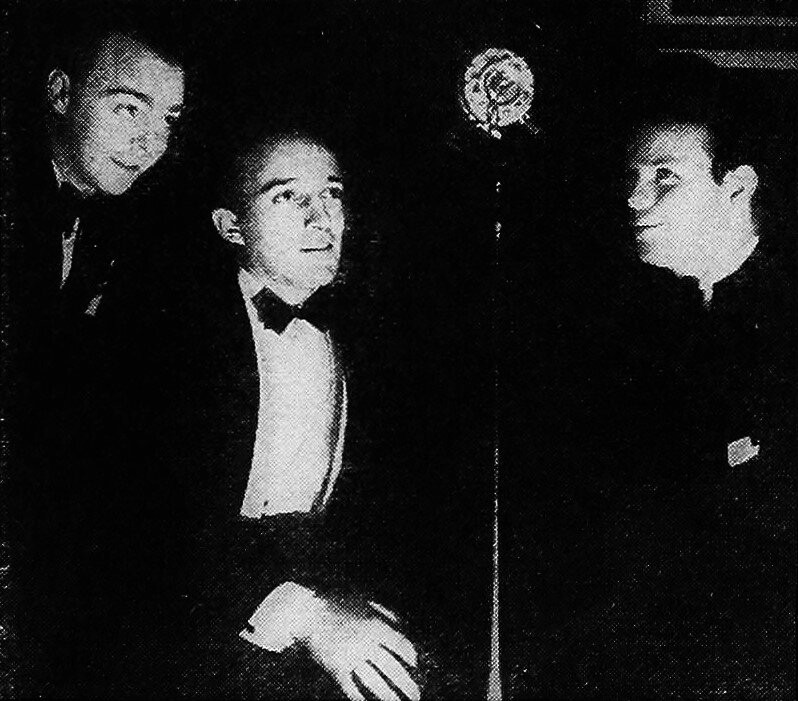 Radio broadcasts from the Cocoanut Grove made Bing a star, but his wild ways caused him to start missing performances, and Crosby’s pay was docked. The Rhythm Boys quit playing at the club, but the local musicians’ union banned them from playing, which caused the Rhythm Boys to call it quits. Bing’s solo career soared after the Rhythm Boys broke up. Crosby went on to become one of the biggest stars of Twentieth century. His song “White Christmas” was the biggest selling record of all time until Elton John’s 1997 version of “Candle In The Wind” finally outsold it. The Rhythm Boys performed only one more time, in 1943, on a radio broadcast called Paul Whiteman Presents.
Radio broadcasts from the Cocoanut Grove made Bing a star, but his wild ways caused him to start missing performances, and Crosby’s pay was docked. The Rhythm Boys quit playing at the club, but the local musicians’ union banned them from playing, which caused the Rhythm Boys to call it quits. Bing’s solo career soared after the Rhythm Boys broke up. Crosby went on to become one of the biggest stars of Twentieth century. His song “White Christmas” was the biggest selling record of all time until Elton John’s 1997 version of “Candle In The Wind” finally outsold it. The Rhythm Boys performed only one more time, in 1943, on a radio broadcast called Paul Whiteman Presents.
Here’s a couple of bonus recordings. The first is the “Original Rhythm Boys” performing “Ya Got Love” from the 1931 Paramount motion picture “Confessions of a Co-Ed”. Next up is Paul Whiteman reminiscing about Bing Crosby and the Rhythm Boys in 1953. (THESE RECORDINGS ARE BOTH MISSING, IF YOU HAVE THEM LET US KNOW.)
Thanks to Dennis Pereyra and Dave Dixon for their help with this page.

| Title | Recording Date | Radio Program | Station |
| A Bench In The Park | 5-1930 | Walter O’Keefe Show | KFOX |
| Everything’s Agreed Upon | 5-1930 | Walter O’Keefe Show | KFOX |

| Title | Recording Date | Recording Location | Company |
| A Bench In The Park (Jack Yellen / Milton Ager) |
5-23-1930 | Hollywood, California | Columbia 2223-D |
| From Monday On (Harry Barris / Bing Crosby) |
1-12-1928 | New York, New York | Victor 24349 41612-1 |
| From Monday On (Harry Barris / Bing Crosby) |
1-12-1928 | New York, New York | Victor 21302-A 41612-3 |
| Louise Theme Song from Motion Picture “Innocents Of Paris” (Leo Robbin / Richard Whiting) |
4-20-1929 | New York, New York | Columbia 1819-D Columbia 5457 |
| Miss Annabelle Lee (Who’s Wonderful, Who’s Marvelous?) (Sidney Clare / Lew Pollack) |
11-17-1927 | Chicago, Illinois | Victor 21104 |
| Mississippi Mud I Left My Sugar Standing In The Rain (Harry Barris / Sammy Fain / Irving Kahal) |
6-20-1927 | New York, New York | Victor 24240-B 39271-2 |
| Mississippi Mud and I Left My Sugar Standing In The Rain (Harry Barris / Sammy Fain / Irving Kahal) |
6-20-1927 | New York, New York | Victor 20783-B 39271-3 |
| My Suppressed Desire (Theme Song from The Motion Picture “Gang War”) (Miller / Cohn) |
11-10-1928 | Chicago, Illinois | Columbia 1629-D |
| Rhythm King (Joe Hoover / Jo Trent) |
11-10-1928 | Chicago, Illinois | Columbia 1629-D |
| So The Bluebirds And The Blackbirds Got Together (Harry Barris / Billy Moll) |
1-25-1929 | New York, New York | Columbia 1819-D Columbia 5457 |
| So The Bluebirds And The Blackbirds Got Together (from “King of Jazz”) (Harry Barris / Billy Moll) |
1929 | Hollywood, California | Universal |
| Sweet L’il and Ain’t She Sweet (Harry Barris / Jack Yellen / Milton Ager) |
6-20-1927 | New York, New York | Victor 24240-A |
| That’s Grandma (Harry Barris / James Cavanaugh / Bing Crosby) |
5-25-1928 | New York, New York | Columbia 1455-D |
| That’s Grandma (Harry Barris / James Cavanaugh / Bing Crosby) |
11-11-1927 | Chicago, Illinois | Victor 27688 |
| Them There Eyes (with Gus Arnheim and his Orchestra) (Maceo Pinkard / Tracy / Tauber) |
11-20-1930 | Hollywood, California | Victor 22580-B |
| Three Little Words (with Duke Ellington and his Orchestra) (Ruby / Kalmar) |
8-26-1930 | Hollywood, California | Victor 22528 |
| Wa-Da-Da (Ev’rybody’s Doin’ It Now) (Harry Barris / James Cavanaugh) |
5-25-1928 | New York, New York | Columbia 1455-D |
| What Price Lyrics? (Harry Barris / Matt Malneck / Bing Crosby) |
2-29-1928 | New York, New York | Victor 24349-A 43121-1 |
| What Price Lyrics? (Harry Barris / Matt Malneck / Bing Crosby) |
2-29-1928 | New York, New York | Victor 21302-B 43121-3 |
| Artist | Instrument |
| Harry Barris | Vocals, Piano |
| Bing Crosby | Vocals |
| Matt Malneck | Viola |
| Al Rinker | Vocals |
| unknown | Ukelele |

| Title | Director | Year |
| King Of Jazz | John Murray Anderson | 1930 |
| Confessions of a Co-Ed | David Burton and Dudley Murphy | 1930 |
| Bing Crosby; A Pocket Full Of Dreams; The Early Years 1903-1940 by Gary Giddens, Little, Brown and Company, 2001 |
| Pops : Paul Whiteman, King of Jazz, by Thomas A. DeLong, New Century Publishers, 1983. |
Redhotjazz.com was a pioneering website during the "Information wants to be Free" era of the 1990s. In that spirit we are recovering the lost data from the now defunct site and sharing it with you.
Most of the music in the archive is in the form of MP3s hosted on Archive.org or the French servers of Jazz-on-line.com where this music is all in the public domain.
Files unavailable from those sources we host ourselves. They were made from original 78 RPM records in the hands of private collectors in the 1990s who contributed to the original redhotjazz.com. They were hosted as .ra files originally and we have converted them into the more modern MP3 format. They are of inferior quality to what is available commercially and are intended for reference purposes only. In some cases a Real Audio (.ra) file from Archive.org will download. Don't be scared! Those files will play in many music programs, but not Windows Media Player.


